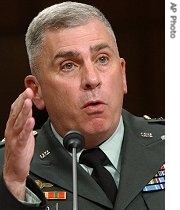2006年VOA标准英语-General Says US Troop Levels Right in Iraq, Ira(在线收听)
By Al Pessin
Pentagon
15 November 2006
The top U.S. commander in the Middle East says now is not the time for a significant increase or decrease in U.S. combat units in Iraq. But the general says there may be an increase in the number of U.S. trainers working directly in Iraqi army units. General John Abizaid testified at a hearing of the Senate Armed Services Committee that it is still possible to achieve stability and self-sufficiency in Iraq, but only if the Iraqi government disbands sectarian militias very soon.
-----
 Gen. John Abizaid, Nov. 15, 2006 |
||
"I said, 'In your professional opinion, if we were to bring in more American troops now does it add considerably to our ability to achieve success in Iraq?' And they all said, 'No.' And the reason is because we want the Iraqis to do more," he said.
General Abizaid said if there were too many U.S. troops in Iraq, it would be easy for Iraqi forces to rely on them to confront the insurgents and militias. He said U.S. and Iraqi officials want the Iraqi forces to take more responsibility for security as soon as possible.
While the general faced calls from some senators for more troops in Iraq, others called for a timetable for withdrawal. The general also rejected those calls.
"At this stage in the campaign, we'll need flexibility to manage our force and to help manage the Iraqi force. Force caps and specific timetables limit that flexibility," he said.
The general also departed from Bush administration policy, telling one senator that although he thinks troop levels are right in Iraq now, there should have been more U.S. troops there in the immediate aftermath of the invasion to help prevent the current situation from developing.
Republican Senator John McCain, who is expected to run for president, criticized General Abizaid for advocating a "status quo" approach in a bad situation.
The general said he does not advocate status quo, but rather wants an increase in Iraqi military and government activity, rather than American.
General Abizaid said one key to the security challenge in Iraq is to move more Iraqi units into leading positions as fast as possible. To do that, he said he is increasing the number of American trainers embedded with Iraqi units.
He also called on the government of Prime Minister Nouri al-Maliki to show confidence in the Iraqi troops' growing ability.
"They need to be supported by their own government, he said. "The government needs not to support the sectarian militias. They need to disband the sectarian militias."
The general said there have been some indications recently that the government is becoming more confident in its own troops, and he said it must use those troops to credibly confront the militias, particularly the one led by powerful Shi'ite cleric Moqtada al-Sadr.
He said he told Prime Minister Maliki in a meeting on Monday that that must be done "very soon."
"I think he must move against the Sadr Militia if Iraq is to become a free and sovereign and independent state," he said. "I believe he will, and he will use the Iraqi army to do so, and he will use political activity to ensure the disarmament."
General Abizaid said success in making Iraq stable and prosperous is essential, and that failure in Iraq would embolden Iran and the al-Qaida terrorist network to foment instability in the region, and would deepen Sunni-Shi'ite divisions.
Later, at the House of Representatives, the general was asked whether he believes Iraq is close to civil war. "I do not believe that we are close to civil war. I believe civil war is possible if the government does not seriously address the sectarian problem," he said.
General Abizaid made a similar statement in August.
On Wednesday, the general also said violence has gone down a bit in Iraq since the end of the Muslim holy month, Ramadan. But he said the security situation has "not turned the corner" and that much difficult work remains to be done, particularly by the Iraqi government and security forces.